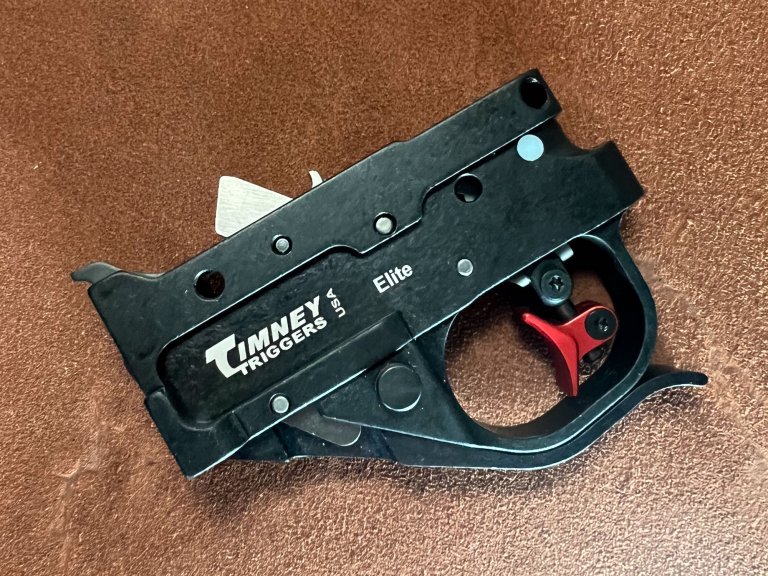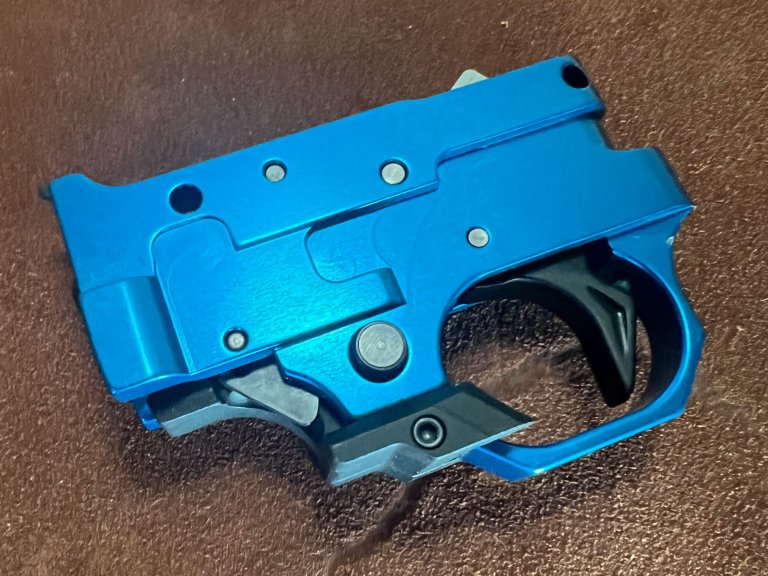We may earn revenue from the products available on this page and participate in affiliate programs. Learn More ›
Buying an aftermarket Ruger 10/22 trigger is one of the best ways to improve the performance of this iconic semi-auto rimfire. Swapping the stock trigger for a quality replacement can enhance accuracy and help with faster, precise follow-up shots, as well as provide a more pleasant shooting experience.
Installing a replacement trigger is easy, too. To access the trigger just undo the single fastener that holds the stock and action together. It is located right in front of the magazine well. After loosening it, place the 10/22 crossbolt safety in the middle position and pull the stock and barreled action apart.
Two drift pins hold the stock trigger in place. Tap them out, remove the trigger assembly, put the new trigger in place, and reinsert the drift pins. That’s all there is to it.
When it comes to selecting a good Ruger 10/22 trigger, there are a lot of options to choose from. To get a meaningful performance upgrade you’re typically looking at triggers that cost around $250 to $350, depending on what you spec out.
How We Selected the Best 10/22 Triggers
We took a handful of basic Ruger 10/22s and modified them with numerous upgrades. We tested them with new stocks, new barrels, and, of course, replacement Ruger 10/22 triggers.
We evaluated these upgrades on their ease of use, performance gains, ergonomics, and value. The Ruger 10/22 triggers in this list are those we liked the most and, in our opinion, delivered the best bang for the buck.
Best Ruger 10/22 Triggers
Timney Ruger 10/22 Trigger
- Trigger Pull Weight: 2 pounds, 10 ounces (measured)
- Cost: $299
Key Features
- Two housing colors
- Six trigger colors
- Extended magazine release below trigger guard
This is a basic drop-in replacement trigger for the Ruger 10/22 from Timney. Like the other triggers in this roundup, it attaches to the receiver via two drift pins that slide easily in and out of place.
When ordering one from Timney you can specify either a black or silver housing cover, and pick from among six different trigger colors: black, blue, red, gold, green, and silver.
Timney sets the triggers at 2 ¾ pounds at the factor. Ours was right on the money at a measured 2 pounds, 10 ounces.
The trigger break is crisp with no perceptible take-up or creep. It’s everything you want in a high-quality replacement Ruger 10/22 trigger.
At $299, it represents a good value, and mine has lasted through hundreds of rounds without any issues.
Timney Calvin Elite Ruger 10/22
Key Features
- Available in single- or two-stage configurations
- Trigger shoe adjusts for length of pull, cast, and height
- Extended magazine release below trigger guard
- Two housing colors
- Trigger Pull Weight: 2 pounds, 5 ounces (measured)
- Cost: $328
The Calvin Elite Ruger 10/22 trigger is easy to identify by its adjustable trigger shoe. Where the trigger shoe on the standard Timney Ruger 10/22 trigger assembly is fixed in place, the trigger shoe on the Calvin Elite is mounted on a post with two set screws.
The lower set screw lets you adjust the trigger shoe height and cant, while the upper set screw allows you to adjust the trigger’s reach. Tweaking these dimensions lets the shooter dial in a customized fit. Both set screws use a Torx T10 driver.

Timney also sets the pull weight on the Calvin Elite Ruger 10/22 trigger lower than on the standard Timney drop-in. They advertise a pull weight from 1.5 to 2 pounds with the Calvin Elite. The weight on our sample was 2 pounds, 5 ounces.
You can also pick between a single-stage trigger and a two-stage trigger. Both cost the same, at $328. We tested the single stage trigger and, while it has a bit of take-up, there’s no gritty creep. The break was clean and crisp.
The only way the Calvin Elite falls short of the standard Timney Ruger 10/22 trigger is with respect to the available colors. All Calvin Elite triggers have a red shoe. The only color option is with the housing. You can pick from either black or silver.
Volquartsen TG2000 Trigger Group
- Trigger Pull Weight: 1 pound, 10 ounces (measured)
- Cost: $339
Key Features
- Adjusts for pretravel and overtravel
- Incorporates magazine release under trigger guard
- Magazine release wings are removable
- Housing available in multiple finishes

The quality of the Volquartsen TG2000 Ruger 10/22 trigger is evident the moment you lay eyes on it. The trigger’s housing is machined from 6061 aluminum that’s been anodized and not only looks good, but gives off an impression of precision.
The trigger guard, for instance, is milled with angled flats on the outside that are attractive and will pair well, from an aesthetic standpoint, with many aftermarket Ruger 10/22 stocks.
Like the other replacement Ruger 10/22 triggers here, the TG 2000 features an ergonomic magazine release positioned under and in front of the trigger guard. The magazine release, which the company calls the TG2000 Rapid Release, comes with wings that stick out on either side of the trigger guard for easy access. The wings are attached to the main release with 3/32-inch Allen screw fasteners, so you can remove one, or both, if you desire.
Another way you can customize the trigger is by adjusting its pre-travel and overtravel. Overtravel is the distance the trigger moves after the sear breaks, and pre-travel is the amount of movement in the trigger before it encounters the sear.
While the Volquartsen TG2000 isn’t technically a two-stage trigger, the pre-travel adjustment gives the user the option to create a degree of take up that nearly mimics that on a two-stage design. Or, the user can minimize the amount of pre-travel, giving it a more classic single-stage trigger feel.

That adjustment is done via a 1/16-inch Allen wrench that’s inserted through the front of the trigger housing.
The overtravel is adjusted with a 5/64-inch Allen wrench. There’s a set screw on the rear of the trigger that controls the depth to which the screw extends inside the trigger guard. The deeper that screw, the less overtravel in the trigger.
Volquartsen has a page with a video that details how to go about adjusting these specs.
The trigger comes from the factor with an advertised 2.25-pound trigger weight that isn’t adjustable. The pull on our sample measured 1 pound, 10 ounces. This is obviously a fair bit lighter than the specified trigger pull weight, but I didn’t mind. The break was crisp and extremely consistent.
I selected the bright blue anodizing on my trigger, but it can be had in other colors including black, silver, bright orange, flat-dark earth, and OD green.

Final Thoughts on the Best 10/22 Triggers
The triggers listed here are all high-quality upgrades that will improve any Ruger 10/22. They will enhance accuracy, make for faster and smoother reloads, let you shoot with precision more quickly, and add a bit of visual bling to your rifle, helping it stand out from the crowd.
Because the installation process is so simple, anyone with a minimal level of mechanical aptitude can elevate their Ruger 10/22 in just a few minutes time.



